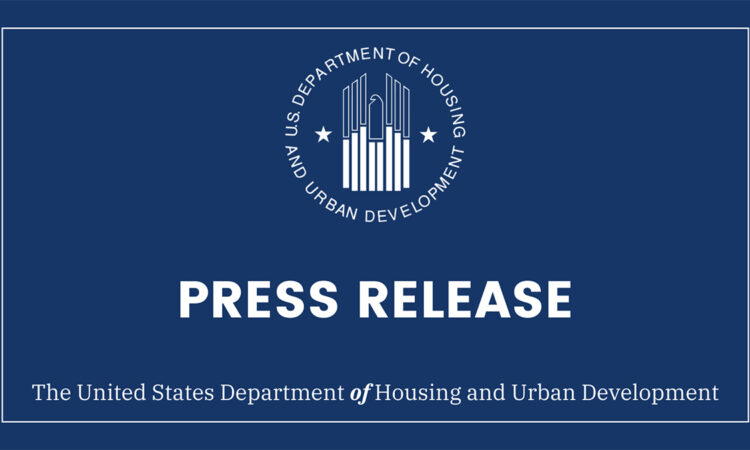HUD Finalizes Deal to Promote Energy Efficiency Climate Resilience and Housing Affordability for California Families as Part of President Biden’s Investing in America Agenda

Transaction funded by Inflation Reduction Act enhances green features and climate resilience measures for renovation of affordable rental housing in Glendale, California.
GLENDALE – Today, the U.S. Department of Housing and Urban Development (HUD)’s Office of Multifamily Housing Programs announced the completion of a $363,131 loan transaction under the Green and Resilient Retrofit Program (GRRP) with Palmer Park Housing Partners, LP as part of President Biden’s Investing in America Agenda. This funding from the Inflation Reduction Act—the largest climate investment in history—will support energy efficiency and climate resilience renovations for the Palmer Park apartment community in Glendale, California that will help reduce housing costs and increase preservation of affordable housing. Notably, Palmer Park, a 12-unit, two-story building serving low-income individuals and families, marks the first integration of a GRRP award into a construction project in California, strengthening its ability to withstand environmental challenges while optimizing energy usage.
“Under this Administration, we are not just talking the talk on climate resilience and energy efficiency – we are making things happen,” said HUD Acting Secretary Adrianne Todman. “Today, we are delivering a deal to make crucial green upgrades for families in Glendale, California, ensuring these affordable rental households are efficient and resilient for the future.”
Palmer Park receives rental assistance from HUD’s Section 8 program for all 12 households. Built in 1983, the property is undergoing rehabilitation to improve energy and water efficiency, with upgrades including Energy Star windows and refrigerators, a new roof, low-flow plumbing fixtures, exhaust fans and LED lighting. These enhancements are funded by HUD’s GRRP.
“This first GRRP transaction to close in California showcases the ability of Green and Resilient Retrofit Program funding to help properties of all sizes become safer, more energy efficient, and healthier,” said Deputy Assistant Secretary for Multifamily Housing Programs Ethan Handelman. “Financing these important upgrades at Palmer Park, and similar properties throughout the country will improve the lives of residents and highlights this Administration’s dedication to addressing both affordable housing and climate change.”
About GRRP
Funded under the Inflation Reduction Act, GRRP provides funding for direct loans and grants to make improvements to HUD-subsidized properties serving very low-income families, seniors, and persons with disabilities. Properties were selected through three distinct funding opportunities designed to meet the diverse needs of properties across the country. Funding can be used to improve energy or water efficiency, enhance indoor air quality, install zero-emission electricity generation and energy storage equipment, acquire low-emission building materials, implement building electrification strategies, or address and improve climate resilience. The program seeks to amplify recent technological advancements in energy and water efficiency and to bring a new focus on preparing for climate hazards by reducing residents’ and properties’ exposure to hazards and by protecting life, livability, and property when disaster strikes.
HUD has offered funding through three GRRP award types targeting HUD-subsidized affordable housing:
- Elements awards provide modest funding for property owners to incorporate proven and impactful climate resilience and carbon reduction measures to the construction scopes of an in-progress recapitalization transactions. Property owners use the funds to add green or resilient elements to existing scopes of property rehabilitation.
- Leading Edge awards provide funding for property owners to meet ambitious carbon reduction, renewable energy generation, and resilience goals without requiring extensive technical assistance from HUD.
- Comprehensive awards provide funding for properties with the highest need for climate resilience and energy efficiency upgrades to undertake a deep retrofit, focused on innovative energy efficiency and greenhouse gas emissions reductions, green and healthy housing measures, renewable energy generation, and climate resilience investments. Comprehensive Awards are designed for the widest range of properties and are accompanied by direct support from HUD to achieve the retrofit.
FACT SHEET: Green and Resilient Retrofit Program Progress to Date
- GRRP is the first HUD program to simultaneously invest in energy efficiency, renewable energy generation, climate resilience, and low-embodied-carbon materials in HUD-assisted multifamily housing that leads to housing affordability and preservation. All of the investments under the GRRP will be made in affordable housing communities serving low-income families, directly benefiting HUD-assisted housing, in alignment with the Justice40 Initiative.
- As of May 21, 2024, GRRP funding has been awarded to 122 properties and more than 14,000 rental homes, to make them greener, healthier, and safer for low-income households, seniors, and persons with disabilities. The projects span the range from targeted upgrades to major net-zero renovation for properties in 36 states and the District of Columbia
- As of May 21, 2024, HUD has awarded more than $610 million in grants and surplus cash loans under the GRRP; $255.5 million in grants and $355.8 million in surplus cash loans.
- Of the awardees receiving grants and loans in seven rounds of funding, 99 are properties receiving Multifamily Section 8 project-based rental assistance, 21 properties are receiving Section 202 project-based rental assistance for low-income seniors, and one is receiving Section 811 project-based rental assistance for low-income persons with disabilities.
- GRRP is designed to work for properties of all sizes, and with a range of energy efficiency and climate resilience needs. More than 20 properties receiving grant and loan awards have fewer than 50 units, some 77 properties have between 50 and 100 units, while 17 have more than 200 units.
- More than 800 properties have also signed up for HUD’s free energy and water benchmarking service, funded with more than $40 million from the President’s Inflation Reduction Act, so that HUD-assisted housing property owners can better understand the energy and water consumption at their properties in relation to other similar properties. This benchmarking information can in turn be used to assess energy efficiency and water conservation upgrades that can be funded under the GRRP.
More program information is available on the GRRP Website.






